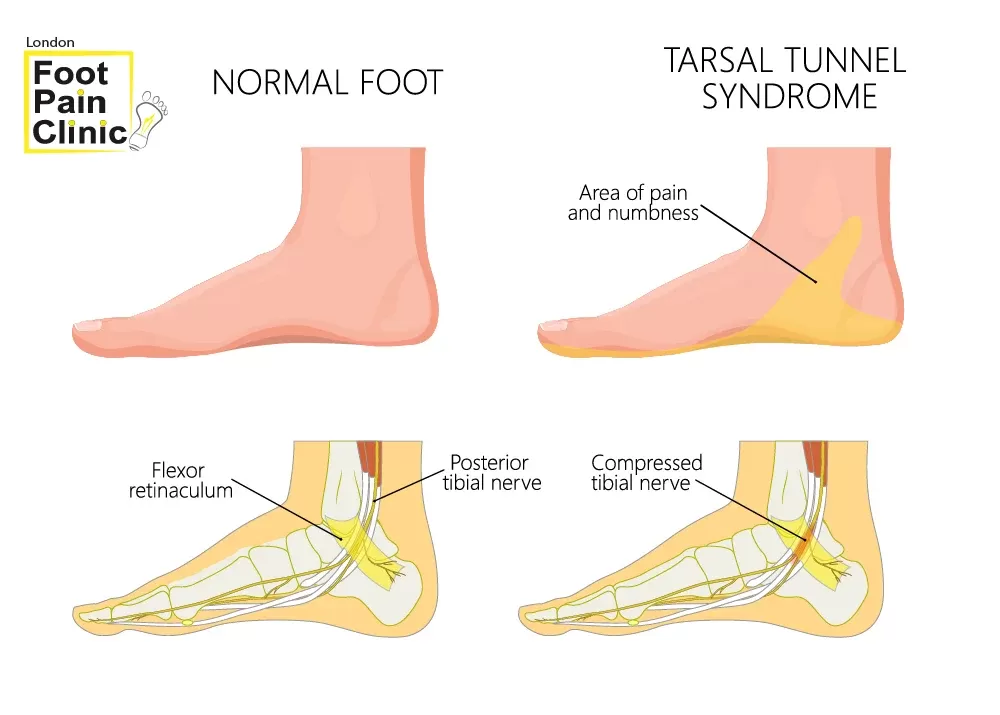Tarsal Tunnel Syndrome: Understanding and Treatment
Headline
Welcome to the London Foot Pain Clinic in the heart of Wimbledon, London, SW19. Our clinic specialises in diagnosing and treating various foot conditions, including Tarsal Tunnel Syndrome (TTS), a familiar yet often misunderstood condition affecting the foot and ankle. Here, we aim to provide comprehensive information about TTS, its causes, symptoms, and effective treatment options available at our clinic.

What is Tarsal Tunnel Syndrome?
Tarsal Tunnel Syndrome is characterised by pain, tingling, or numbness that originates in the medial ankle and can extend towards the toes. It occurs when the posterior tibial nerve, which runs through the tarsal tunnel, a narrow space inside the ankle, becomes compressed or squeezed.
Causes of Tarsal Tunnel Syndrome
One of the primary causes of TTS is overpronation, which can result from flat feet (fallen arches). Overpronation refers to the excessive inward rolling of the foot after landing during walking or running. This condition can increase strain on the posterior tibial nerve by altering the natural alignment of the foot and ankle, leading to nerve compression within the tarsal tunnel.
Symptoms of Tarsal Tunnel Syndrome
The symptoms of TTS can vary but typically include:
- Tingling, burning, or a sensation similar to an electric shock in the foot
- Pain and numbness along the inner ankle and the bottom of the foot, which may extend towards the toes
- Swelling around the ankle
- Symptoms that worsen with activity and improve with rest
Diagnosis
At the London Foot Pain Clinic, our specialists use a combination of clinical examination and diagnostic imaging, such as ultrasound or MRI, to confirm Tarsal Tunnel Syndrome's presence and rule out other conditions that may mimic its symptoms.

Treatment Options
Orthotic Devices
Custom orthotic devices are a cornerstone in treating TTS caused by overpronation and flat feet. These devices are designed to support the arch, redistribute pressure across the foot, and correct the alignment, thereby reducing the strain on the posterior tibial nerve. Our clinic provides personalised orthotics tailored to the specific needs of each patient.
Extracorporeal Shock Wave Therapy (ESWT)
We also offer Extracorporeal Shock Wave Therapy, a non-invasive treatment that has been shown to be effective in managing pain associated with TTS. ESWT delivers shock waves to the affected area, promoting healing and reducing inflammation. This therapy mainly benefits patients who have not responded well to conservative treatment methods.
Lifestyle and Home Remedies
In addition to clinical treatments, we recommend various lifestyle adjustments and home remedies to manage symptoms and prevent further aggravation of TTS. These include:
- Resting and elevating the foot to reduce swelling
- Applying ice packs to the affected area to control pain and inflammation
- Engaging in gentle stretching exercises to improve flexibility and reduce pressure on the nerve

Conclusion
Tarsal Tunnel Syndrome can significantly impact your quality of life by limiting mobility and causing persistent pain. However, with the right approach to diagnosis and treatment, it is possible to manage the symptoms effectively and restore function. At the London Foot Pain Clinic, our team of experts is dedicated to providing the highest standard of care, utilising state-of-the-art treatments to ensure the best patient outcomes.
If you are experiencing symptoms of Tarsal Tunnel Syndrome or have any concerns about your foot health, please contact us to schedule an appointment. Let us help you take the first step towards pain-free living.
---
For further information or to book an appointment, please visit our website or contact our Wimbledon clinic directly. We are here to support your journey to recovery and optimal foot health.